Greetings! I'm Aneesh Sreedharan, CEO of 2Hats Logic Solutions. At 2Hats Logic Solutions, we are dedicated to providing technical expertise and resolving your concerns in the world of technology. Our blog page serves as a resource where we share insights and experiences, offering valuable perspectives on your queries.
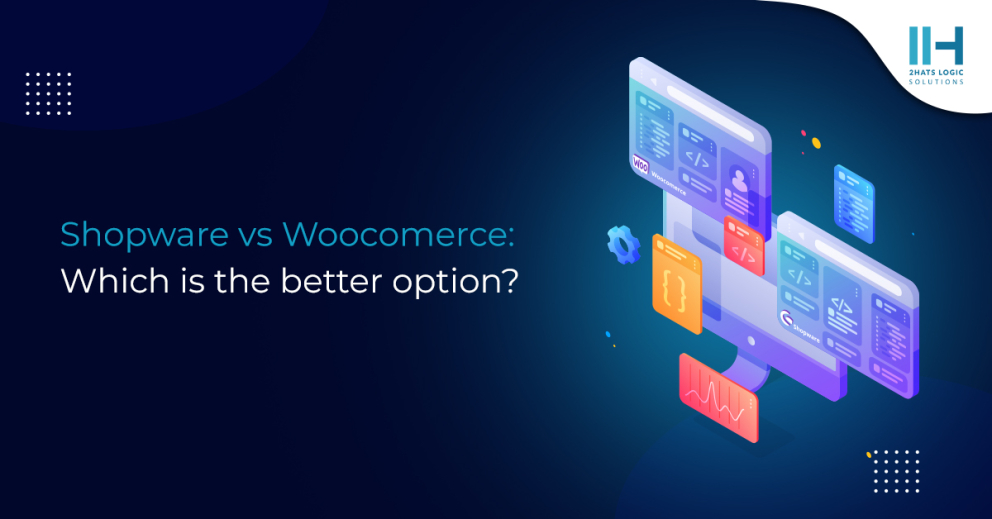
| Quick Summary Shopware is better for scalable businesses needing built-in features, while WooCommerce suits WordPress users seeking flexibility. Shopware offers better native tools but costs more, while WooCommerce provides more customization options through plugins. |
Choosing the right e-commerce platform is crucial for the success of your online business. Among the most popular options, Shopware and WooCommerce stand out for their unique features and capabilities.
If you’re a small business setting up your first online store or an established enterprise planning to scale, understanding the differences between these two platforms is important. This knowledge will help you make the right choice for your business.
In this guide, we’ll compare Shopware vs WooCommerce. Let’s know both in terms of features, scalability, and ease of use. This guide will help you decide which platform best suits your business needs.
What is Shopware?
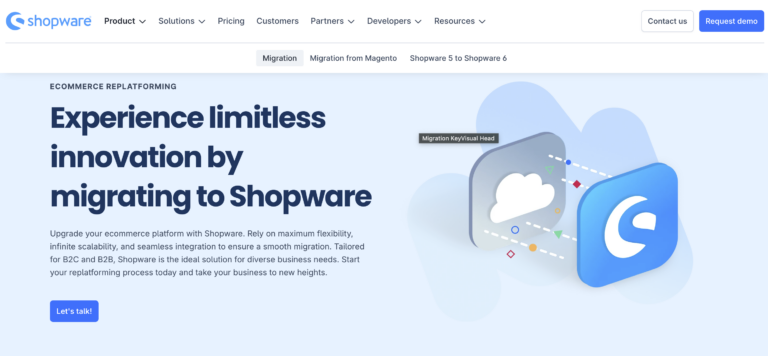
- Shopware is a robust, PHP-based e-commerce platform. This is designed to provide businesses with complete control over their online store environment.
- Shopware is a user-friendly platform. It caters to store owners with or without technical expertise. This helps you to create, customize, and manage an e-commerce store. For further customization, you may require technical Shopware developer support.
- This is an excellent choice for businesses planning to grow. It has multi-store capabilities and easy third-party integrations. Launch a new store or scale your existing one with Shopware.
What is WooCommerce?
- WooCommerce is a powerful e-commerce plugin. This transforms WordPress websites into fully functional online stores. This is popular among small to medium-sized businesses for a cost-effective solution.
- If your company already uses WordPress, this is an excellent choice for easy integration with the ecosystem. A wide range of plugins and themes are available in WooCommerce.
- WooCommerce allows users to customize their store to fit their unique business needs. However, its reliance on third-party plugins for advanced features can add to long-term costs and complexity.
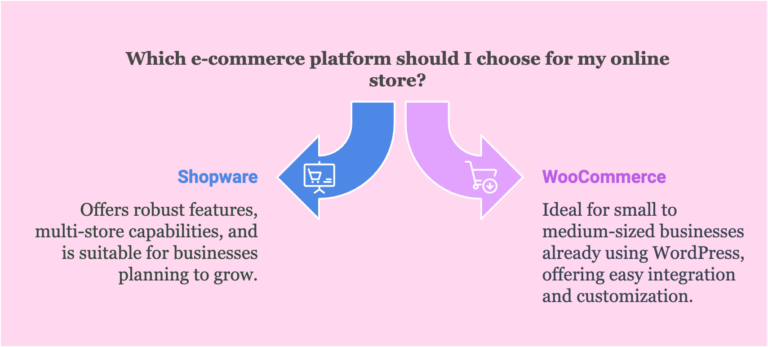
Shopware vs WooCommerce: Key Comparisons
Pricing
Shopware: Offers a free open-source version, but access to premium features requires a subscription. This clear pricing structure helps businesses estimate their costs upfront, making budgeting simpler.
WooCommerce: The plugin itself is free, but additional costs can pile up due to the need for third-party plugins and themes. This makes the overall cost less predictable, especially for businesses seeking advanced features.
Verdict: If you’re looking for a straightforward pricing model, Shopware’s tiered structure is more transparent. However, WooCommerce offers a low entry barrier, especially if you’re already on WordPress.
| Read the blog to find out which e-commerce platform is best for the clothing industry. |
Multiple Stores
Shopware: Multi-store functionality is built-in, enabling businesses to manage multiple stores from a single backend. This is especially useful for companies expanding into new markets or managing different product categories.
WooCommerce: Lacks native multi-store support, requiring additional plugins to implement this feature. This adds complexity, especially if you manage several online stores.
Verdict: If managing multiple stores with one platform is essential, Shopware has the advantage. WooCommerce can achieve the same outcome, but with extra effort and added costs.
SEO Capabilities
Shopware: It includes SEO tools such as meta tag management, URL optimization, and schema markup, all at no additional cost. This can significantly improve your store’s search engine rankings.
WooCommerce: SEO features are available, but many require third-party plugins. Additionally, the platform’s speed can be affected by excessive plugins, potentially hurting SEO performance.
Verdict: Shopware’s built-in SEO capabilities make it an attractive option for businesses.
CONTACT US FOR A FREE CONSULTATION
Marketing Tools
Shopware: As an e-commerce platform designed with marketing in mind. Shopware offers a range of built-in tools, including email marketing integrations, promotions, and customer segmentation.
WooCommerce: While WooCommerce is flexible, it has fewer native marketing features. Most advanced marketing functionalities require additional plugins, leading to higher costs and potential compatibility issues.
Verdict: If marketing is a top priority, Shopware’s built-in tools save you time and effort. WooCommerce’s reliance on plugins might create a fragmented experience.
Ease of Use
| Feature | Shopware | WooCommerce |
| Ease of Use | Designed with simplicity in mind. Its user interface is easy to navigate and requires minimal technical knowledge. Ideal for users seeking an out-of-the-box solution. | User-friendly but has a steeper learning curve, especially for those unfamiliar with WordPress. It requires additional plugins and customizations, making it more time-consuming to master. |
Shopware: Designed with simplicity in mind, Shopware’s user interface is easy to navigate. It doesn’t require extensive technical knowledge to get started. This is ideal for users who want an out-of-the-box solution.
WooCommerce: Although user-friendly, WooCommerce has a steeper learning curve. Especially for those unfamiliar with WordPress. The need for various plugins and customizations can make it more time-consuming to master.
Verdict: If ease of use is your primary concern, Shopware is a better choice due to its simplicity and streamlined features. WooCommerce requires a bit more effort and technical help for advanced customizations.
| Pro Tip While WooCommerce offers flexibility, Shopware’s built-in tools can save you time and reduce reliance on plugins |
Key Features of Shopware
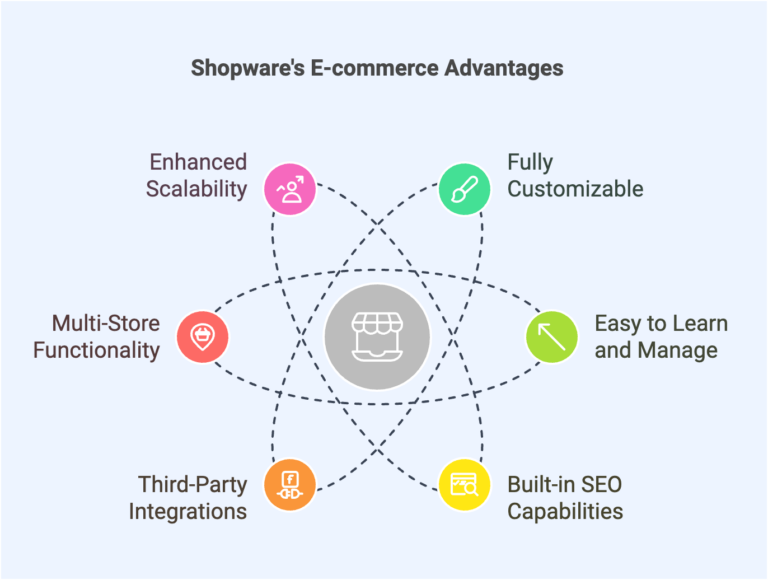
Fully Customizable
Tailor your e-commerce store to reflect your brand’s unique identity. Shopware allows extensive customization, enabling businesses to design customer experiences that stand out.
Easy to Learn and Manage
With an intuitive interface, Shopware simplifies the process of creating and managing an online store.
Built-in SEO Capabilities
Shopware comes with robust SEO tools, such as metadata management and URL optimization. This helps your store rank higher on search engines without relying on third-party plugins.
Third-Party Integrations
Easily connect Shopware with payment gateways, marketing tools, and other applications.
Multi-Store Functionality
Manage multiple stores from a single backend. This makes Shopware an ideal choice for businesses with diverse product lines or international markets.
Enhanced Scalability
Whether you’re running a small online shop or a large e-commerce operation. Shopware’s architecture supports seamless growth as your business expands.
Key Features of WooCommerce
Free to Use
WooCommerce is open-source, making it a budget-friendly option for businesses starting. However, additional costs may arise for plugins and themes.
Highly Flexible and Customizable
With thousands of extensions and themes, WooCommerce offers endless customization options.
Large Developer Community for Support
The extensive WooCommerce community ensures that you can find solutions, tips, and plugins to tackle almost any challenge.
Built-in Analytics
Get insights into your store’s performance with WooCommerce’s built-in analytics, including sales data, customer behavior, and product performance.
Suitable for Businesses of All Sizes
From startups to enterprise-level businesses, WooCommerce scales effectively with your business as it grows.
WooCommerce vs Shopware: Which is Better for You?
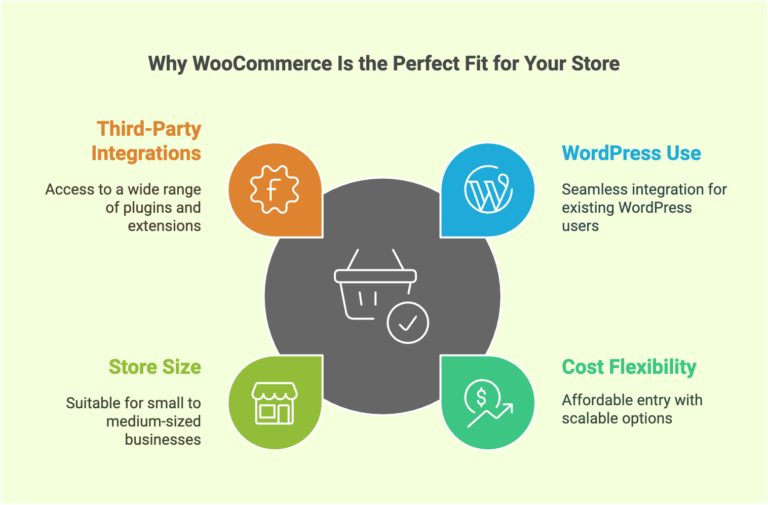
Choose WooCommerce if:
- You already use WordPress: If your website is built on WordPress, WooCommerce is an easy solution for integrating e-commerce capabilities. The plugin integrates perfectly with your existing content, making it a natural fit for WordPress users.
- You need a low-cost, flexible platform: WooCommerce offers a free entry point with the flexibility to scale through paid plugins and customizations. It’s ideal for businesses that want to start small but potentially scale up later.
- You run a small to medium-sized store: WooCommerce works well for businesses with simpler e-commerce needs. If you have a small product range or are just starting, WooCommerce provides essential features without unnecessary complexity.
- You prefer a wide selection of third-party integrations: WooCommerce has a massive library of plugins and extensions, giving you access to a wide array of payment gateways, shipping methods, and other third-party services.
Summary: Choose WooCommerce if you are already in the WordPress ecosystem and need a cost-effective, flexible solution with room for growth through plugins.
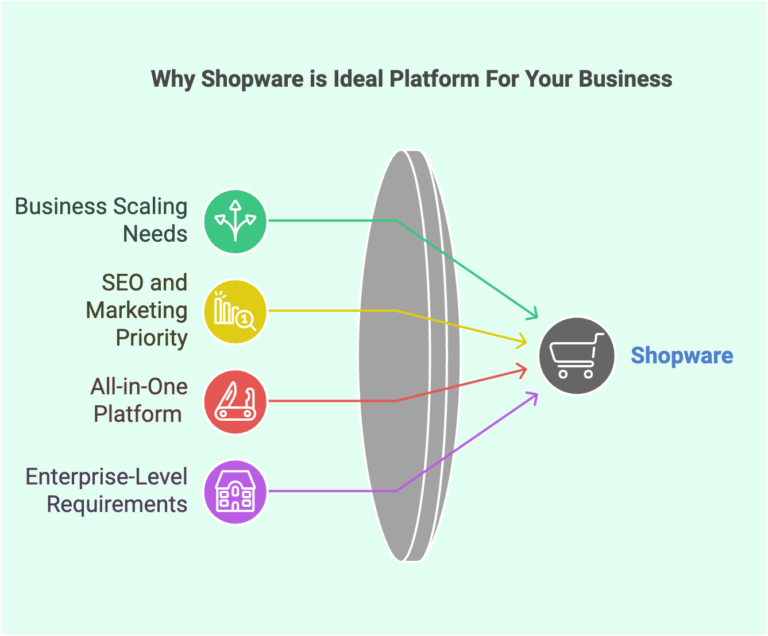
Choose Shopware if:
- You plan to scale your business: Shopware is built to handle the needs of growing businesses. With multi-store capabilities, advanced SEO tools, and robust e-commerce features, it’s an excellent choice if you expect your business to expand and require more complex functionalities in the future.
- SEO and marketing are a priority: If SEO is critical to your success, Shopware’s built-in SEO features provide everything you need to optimize your store for search engines. Additionally, its marketing tools are designed to help you create and manage campaigns easily.
- You want an all-in-one platform: Shopware is a dedicated e-commerce platform that comes with many tools right out of the box, so you won’t need to rely on third-party plugins. This can save time, reduce complexity, and improve long-term site performance.
- You require an enterprise-level solution: Shopware is highly scalable, making it suitable for medium to large businesses that need advanced features, such as integrations with ERPs, CRMs, and other business tools.
Summary: Choose Shopware if you’re serious about growing your e-commerce business and need an all-in-one solution with robust built-in features for SEO, marketing, and multi-store management.
Conclusion
Both Shopware and WooCommerce are easy to use for beginners. If your store is based on WordPress WooCommerce, it probably suits you. But if you want to develop and grow your store and do not have much time to deal with the technicalities of the software then Shopware will be a wiser choice. Contact our experts for a free e-commerce consultation to guide you further.
| Want to learn more about WooCommerce to Shopware Migration, read here. |
FAQ
Which platform is more suitable for international sales?
Shopware with features that allow multiple languages and multiple currencies, is an excellent choice for global commerce. WooCommerce also has universal marketplace compatibility but may require additional plugins for advanced features.
How does customer support compare between the two platforms?
Shopware offers professional support plans, while WooCommerce relies heavily on its community and third-party developers for assistance. Your choice depends on the level of support you need.
Which platform is more cost-effective for startups?
WooCommerce is generally more cost-effective for startups due to its free core software and a wide range of affordable plugins. Shopware might require a higher initial investment but offers advanced features for future scalability.

Related Articles








